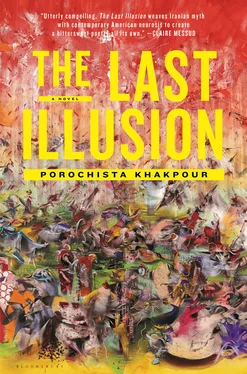And he asked it over and over, until she hit the wall behind her — he didn’t warn her, didn’t think she’d actually back into it — and crumbled, as if it had swatted her to the floor, and began crying, deep panicked sobs.
Zal crouched down and just watched her, without touching her. When he finally got up, his legs cramped, her sobs grew softer, until she could finally squeeze some words out.
“Zal,” she gasped. “You. Don’t. Believe. Me.”
And Zal shook his head, not sure at what exactly.

It was in this period that Zal started closing himself off from the world. He found himself avoiding the computer — the world seemed bleaker than ever, bad politicians, missing girls, shark attacks everywhere. He started avoiding his father and Asiya, the only two people who consistently demanded his attention. His excuse: he wasn’t feeling well.
And it was true: in August 2001, Zal found himself consistently not feeling well. Whether physiological or psychological, he did not know. He just knew that every morning he rose, he regretted it.
And so his solution was to simply not rise. When Asiya or Hendricks would come in or call or want him in some way, Zal would tell them, I don’t feel well. I need to rest today. Over and over. He’d insist it was nothing and yet it was enough to prevent him from participating.
In those last few weeks of summer, Zal simply dropped out: blank page.
Except that dropping out of one world meant dropping into another: the world of his fantasies, from heavy, sickly-sticky dreams to gauzy, easily puncturable, lucid ones. Except for trips to the bathroom, water and some granola for meals, an occasional step or two out the door, he began living exclusively in the attic of his head. And his head was a strange place that season, even he had to admit.
Zal began dreaming in bird again. There he was in the tangles of a nest, his wings tucked against him, waiting with an open mouth for a bigger one bearing small squirming worms. There he was soaring through the scorching summer atmosphere or cutting through sheets of relentless rain. There he was perched on a windowsill, watching human life and all its mundane oddities, big people sitting and standing and lying down and eating and smiling and fighting and just staring. There he was in their garden, on their roof, in their tree, on their steps, with others of his kind but all alone — or with humankind, trapped again, in those airless cubes called rooms, waiting for one of them to carve a square into a wall and open a dimension into the natural world, the real one they barely lived in.
But sometimes the dreams were not so far-fetched — they were not the daily life of an actual bird, but that of a bird boy. There he was in that other world, the old world, that other climate that was his native one, dry and dusty and hot, the country of his ancestry, the village of his family, his homeland. But what did he know of that place, any of it, beyond a single veranda, occupied by others of what he imagined were his lot: the commune of canaries and doves and little white parrots that the older woman, Khanoom — a name he never learned — kept in a wide variety of homemade cages. There he was in his own, a badly bent cylindrical wire tower padded with straw — and damaged, it seemed, bent from his own doing, the nudging and hitting and pushing for things that could never come soon enough: more food, more water, the cleaning up of his space. How she would dwell on all the others, nestle the canaries against her bosom until they’d reanimate with joyous song, line the parrots up on her arms as she flapped them, as if she was Mama Parrot, giving them a playful hurtle up and down. How she filled their cages with worms and bugs and then threw the dregs to him: wet seeds, stale rice, uncooked beans, all sorts of food that was neither, not in that shape at least, for man or bird. He’d envy the others so much, knowing that although he was one of them, he was also somehow different, something more even than just bigger, less feathery, without beak, without claw. He was, after all, familiar with the one name she called him: White Demon.
And he had accepted it.
Sometime he saw her coming in and opening all the cages except his, letting them loose in the covered veranda that they knew so well they bumped into nothing, just spun through the air at top speeds, relishing the rare opportunity at unfettered abandon, in their element, doing what they were born to do, the makers of tornadoes yellow and white, with her, the older woman, in wonder at its axis. She’d look up at them, laughing almost deliriously, holding out her arms as if in a gesture of mass embrace, just enjoying her place at the center of their world. And he’d watch, behind his own bars, neither theirs nor hers, not of that element, but not of this, either. He was doomed to be outsider and observer, sibling to those who even in captivity enjoyed freedoms he thought he’d never come close to knowing. He knew that, and he watched, and he watched, and he watched. And when they complained, as she tucked them back into their cages and hushed them to submission, he bowed his head down, as if not minding them out of respect. In certain ways, he did not envy them — he didn’t know what it was like, after all, had no clue what in the world it would be like to be let out to fly, to be loved like that. He felt related to the concepts, in close reach somehow, and yet ultimately alien.
And he saw her anger and her insanity and her desperation and her depression over and over, up close, her face popping up at his cage at unlikely times: in early dawn, in the middle of the night, more and more so toward the end of his time there. She’d come in sometimes in a rage, eye the others and then glare at him, throw sticks, throw spoons, throw food, and, once, his own feces right back at him, pieces pelting his face and landing in his hair. She’d look deep in his eyes and he’d look back: that wrinkled face the color of the cage’s copper, those steel eyes the color of the metal water dish, and the white of her hair not unlike his — which he could see only when he felt compelled, out of boredom or agitation or, who knows, to pull some out.
He never for a moment thought, This is my mother . He had no such concept.
And yet that was the way the story went. That the dung-flinging, screaming, White Demon — calling old woman was his mother.
In one dream/fantasy/recollection — he did not know what name to give these sessions, that August, when waking and sleeping seemed so hopelessly incestuous — she came in the middle of a particularly bright day, when the sky was bluer than what was normal for that season and even that climate, and she came with a blow at his cage, which at that point was getting too small for him, bent in places that molded the outline of elbows and knees and the back of his head. The cage, precariously propped on concrete blocks, teetered, and he braced himself for more blows. But instead she opened the door of his cage — usually a sign that it was to be cleaned or refurbished or fixed — and, with an expression of disgust, she reached out to his dirty naked body and grabbed him. Her hands felt clawlike with their long nails and dry skin, and for a moment he considered she too may be more bird than he had originally thought, underneath those layers of draped cloth on her body and head. In her hands, he shook quite violently, afraid of what it could mean. She was speaking rapidly, whispering without pause, a coarse hissing that would not end. It had an unpleasant sound. He remembered being so afraid, and then suddenly her grasp softened, her hands became more palms than claws, and his head nestled, like those canaries would get to nestle, against the ample warmth of her bosom that still radiated through those layers of soft cloth. He took hold of her, grabbed on to her fleshy body, so much more abundant than his, which was just, it seemed, a collection of brittle bones under the thinnest layer of skin. She smelled unnatural, not of dirt or food or feces or feathers, but of something crisp and chemical and yet pleasant, a smell that he’d always associate with those perfect blue-sky summer days. And he just lay there, very still so as not to disturb her, letting himself enjoy this most unusual experience of being rocked in that woman’s arms, the woman he never knew he had come from. That was the greatest joy he recalled in those early years, the only memory he was sure of, it was so vivid: the peace he felt, the gentle shaking, his and hers, the sound of her whispery chants, the smell of cleanliness, which he did not know was a thing called cleanliness, the feeling that this could, in spite of all evidence to the contrary, last forever. . though of course it didn’t. He didn’t remember how the episode ended except that it surely must have culminated in the removal of the embrace and the opening of his cage and then the closing, with him in it. He never felt anything quite like that again.
Читать дальше













